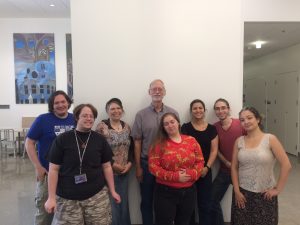
By Michael Peterson
As a biology major at the University of Washington, it may seem strange for me to recommend taking a language course. However, I believe that studying a language is imperative to both one’s education and one’s life.
With the help of a Stroum Center Opportunity Grant, I accepted the challenge of enrolling in the University of Washington’s summer intensive elementary modern Hebrew course, in which students encounter nine months of Hebrew in nine weeks. The course involved learning a new alphabet as well as basic grammar, vocabulary, present tense, and past tense.

Michael Peterson (back right) and his intensive beginning Hebrew class at the UW (photo courtesy author)
The advantage of the summer course was its class size. With only seven students in class, I had many opportunities to work directly with the professor, Hadar Khazzam-Horovitz, and my peers. Class was fun and learning was faster, despite the daunting curriculum.
So now to the real question: Why should anyone take a language? I took Hebrew for a few reasons. First, as a biologist, Hebrew benefits me if I choose to interface with or work for Israeli biotechnology companies, as they are at the forefront of the field. Second, personally, Hebrew allows me to connect more intimately with my religion, Judaism. Last, and perhaps most important, studies show that bilinguals and multilinguals show cognitive benefits over monolinguals.
Research done by Viorica Marian and Anthony Shook has shown that bilingual brains have better attention and task-switching capacities than monolingual brains because bilinguals have developed the ability to inhibit one language over another while using it. Also, bilingual children adjust to environmental changes better, and bilingual seniors experience less cognitive decline.
I took Hebrew this summer and found the benefits to be outstanding. Which language will you take?
[Ed. Note: In addition to offering intensive beginning elementary Hebrew each summer, the UW also offers Modern Hebrew 101 each autumn.]
 Michael Peterson is a senior at the University of Washington majoring in biology. He is a member of the Bioengineers Without Borders team through the Thomas Lab and a founder of the UW’s Sigma Alpha Mu fraternity. He aspires to attend graduate school and work in bioengineering or biotechnology.
Michael Peterson is a senior at the University of Washington majoring in biology. He is a member of the Bioengineers Without Borders team through the Thomas Lab and a founder of the UW’s Sigma Alpha Mu fraternity. He aspires to attend graduate school and work in bioengineering or biotechnology.
For Further Exploration
-
- Find out more about applying for Opportunity Grants to fund study abroad or domestic academic experiences related to Jewish Studies. Applications for the next grant cycle are due October 23, 2017.
- Read articles by former winners of Jewish Studies Opportunity Grants, who have traveled to Prague, Jordan, Israel, the Black Sea, and elsewhere.
- For more about UW’s year-round course offerings and resources in Hebrew language and culture, visit Prof. Naomi Sokoloff’s website, Modern Hebrew at UW.
- Take a Jewish Studies course at UW this autumn.







I think that the third point you make about the cognitive benefits of studying multiple languages is an excellent one. I would also notice that in my study of Biblical Hebrew, I have gained a greater grasp of English grammar as well.
He never says how much he learned, is he now able to speak Hebrew